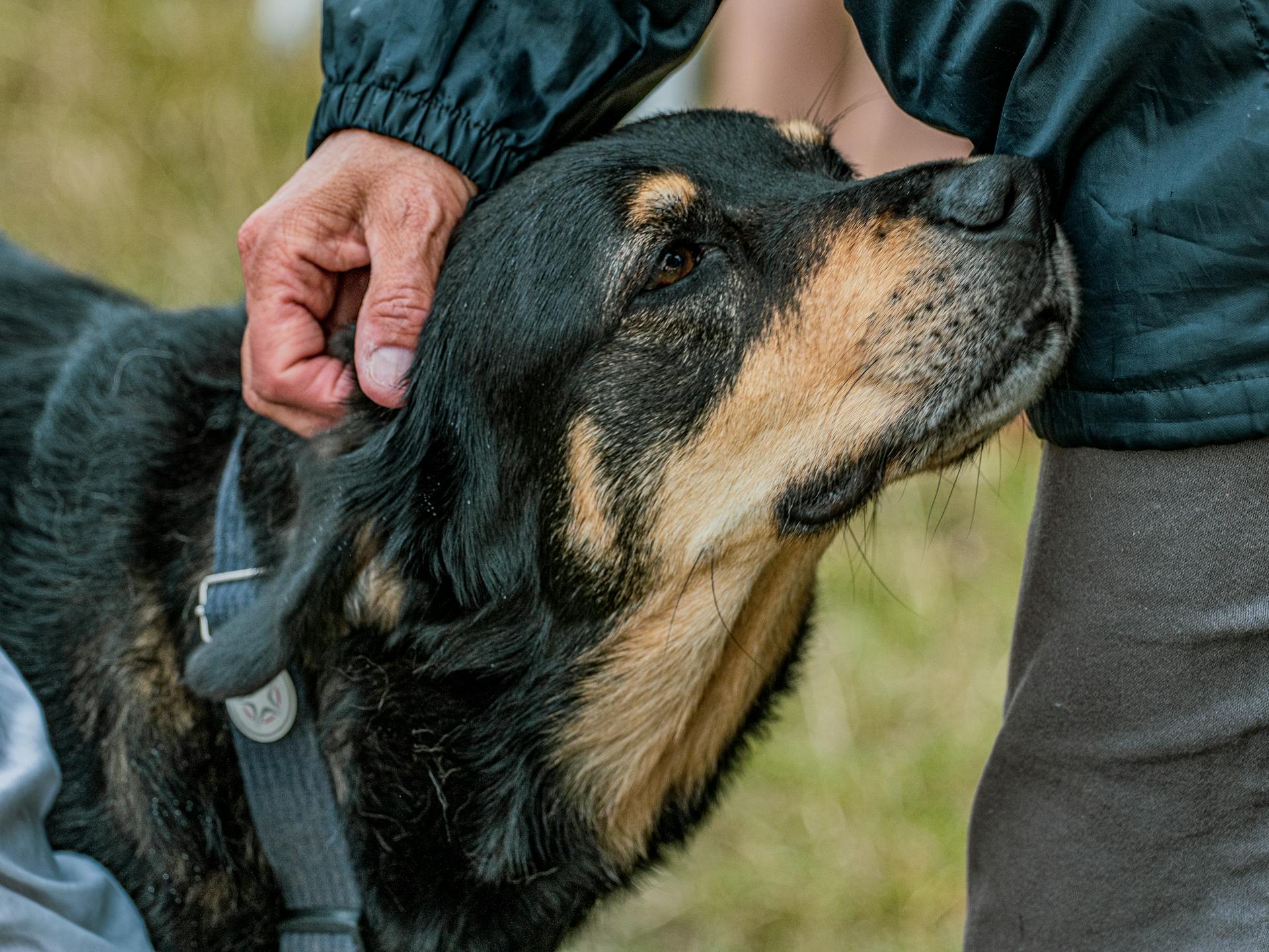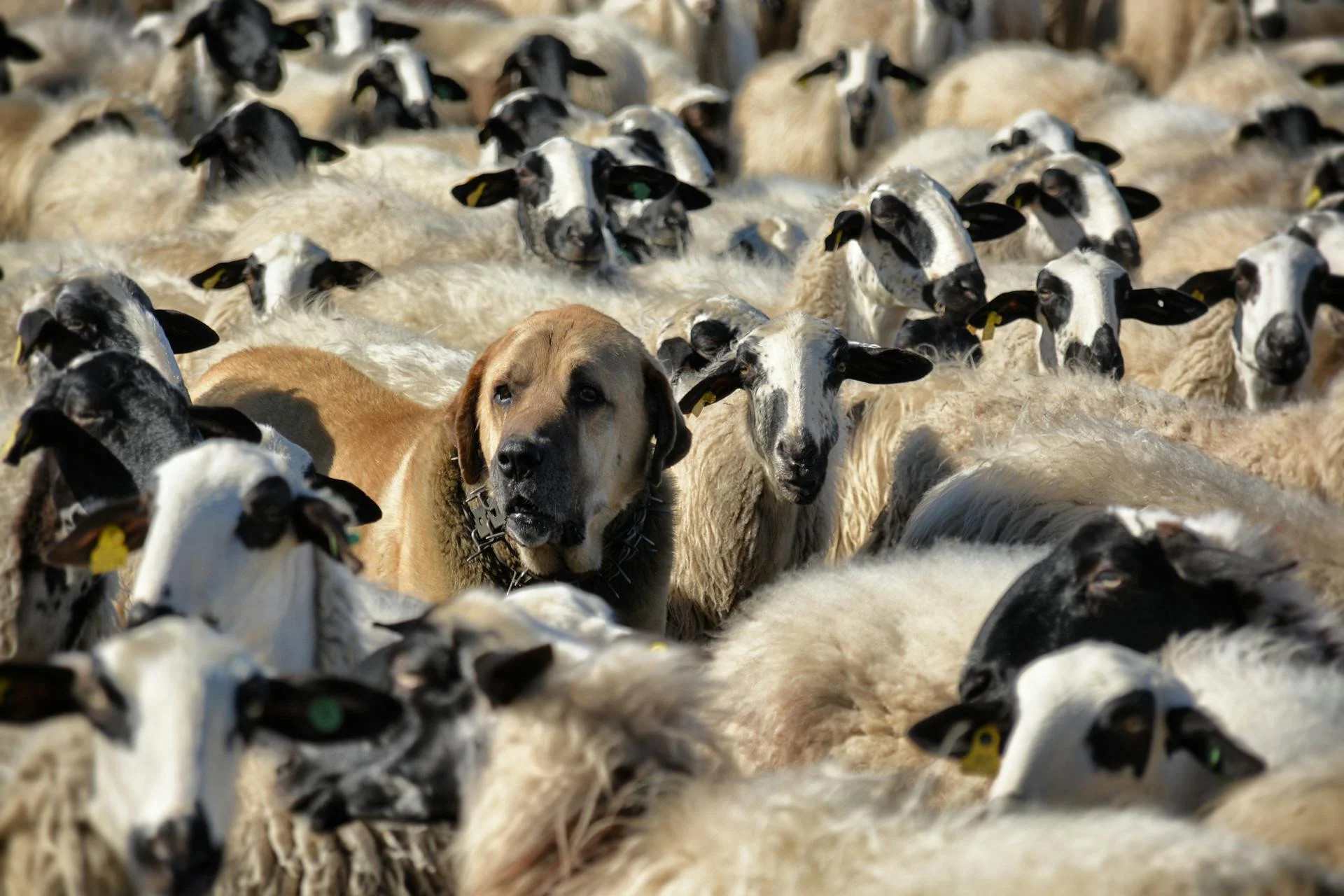
Rottweilers are naturally protective of their families and territory, which can sometimes be misinterpreted as aggression.
They have a strong instinct to defend and guard, inherited from their past as livestock herders and police dogs.
Rottweilers are intelligent and trainable, but they can be stubborn at times.
This breed requires consistent, positive reinforcement training from an early age to develop good behavior.
With proper socialization and training, Rottweilers can thrive in a variety of living situations, from apartments to homes with yards.
Their loyalty and affection towards their family is unmatched, making them excellent companions for those who understand their needs.
What is a Rottweiler?
Rottweilers are a breed of domestic dog known for their distinctive appearance, which includes a short, dense coat that's typically black with rust markings.
They originated in Roman times as drover dogs, used to herd cattle and guard livestock.
Rottweilers are a medium to large breed, with males weighing between 95 and 130 pounds and standing between 24 and 27 inches tall at the shoulder.
Their muscular build and athletic ability make them well-suited for tasks that require strength and endurance.
The breed's intelligence and loyalty also make them popular as family pets and working dogs.
Despite their tough exterior, Rottweilers are often described as gentle and affectionate, particularly with their family.
Their strong protective instincts can make them wary of strangers, but with proper socialization, they can learn to be friendly and outgoing.
Explore further: Are Boxer Dogs Good Family Dogs
Rottweiler Temperament
Rottweilers are naturally strong, brave, intelligent, and biddable, traits that serve them well as guard dogs and companions.
They can be stubborn at times, especially if they don't want to perform a task, and may be destructive when young.
However, once they reach adulthood, Rottweilers tend to be serious-minded and not keen to play games unless they're challenging.
Rottweilers are generally quiet, gentle, and calm dogs, and are known to follow their pet parents around the house and desire close companionship.
Their intelligence and trainability make them excellent candidates for obedience training and socialization, which is essential to prevent aggression towards people or other pets.
Rottweilers are loving dogs and can be quite sensitive and needy, but they also have a playful and silly side, and are happy to cuddle with their owners.
A Brief History
Rottweilers have a rich history that's hard to ignore. They descended from Asian mastiffs and were used as herding dogs to protect livestock in ancient Rome.
Their versatility as working dogs has been evident throughout history. Rottweilers functioned as working dogs throughout much of the world.
In the Middle Ages, they earned the nickname "butcher dogs" because they'd travel with butchers to protect and even help pull carts filled with meat to markets. Butchers would put their earnings in a leather purse attached to the dog's collar to ensure no one would take it.
As intelligent and trainable dogs, Rottweilers served as search and rescue dogs and police dogs in the early 20th century. They were also used as military guard dogs during World War I.
Despite their decline in military and police work, Rottweilers remain popular companions, ranking as the eighth most popular dog breed in 2021 according to the American Kennel Club.
Worth a look: Where Did Rottweilers Come from
Temperament, Personality Traits
Rottweilers can be strong-willed and stubborn, especially when told to perform a task they don't want to do. They can be destructive when young, but tend to be serious-minded and not keen on playing games once they reach adulthood.
The breed is not prone to prolific barking, but it's essential to note that Rottweilers can be aggressive around other pets, and owners must ensure they're extensively trained and socialized to prevent this behavior.
Rottweilers are loyal to their loved ones, but can be reserved and suspicious around unfamiliar people. They're not usually friendly towards strange dogs, and dogs of the same sex within a household may not get along.
Rottweilers are naturally protective, but proper training, socialization, and a happy home life can turn them into perfect pets. They're loving, sensitive, and needy, and can even be quite playful and silly.
The typical Rottweiler temperament ranges from being a natural clown to being very reserved, and each dog is an individual. Breed only makes up about 9% of any dog's overall behavior.
Rottweilers are generally quiet, gentle, and calm dogs, and they often follow their pet parents around the house, desiring close companionship.
Check this out: Canine Play Behavior
Rottweiler Care
Rottweiler care is essential for raising a happy, healthy, and well-behaved dog. Rottweilers are loyal and slow-maturing dogs that need at least 60 minutes of exercise every day.
To ensure they get enough physical activity, you'll need to dedicate time to taking your Rottweiler on a daily walk or run. A Rottweiler's coat is short and black with tan to mahogany accents, but grooming is not a major concern.
However, mental stimulation is crucial to prevent boredom and unwanted behaviors like chewing your furniture. Rottweilers are intelligent dogs that need to be engaged and challenged regularly.
To provide mental stimulation, you can try training your Rottweiler with obedience commands, socializing them with other people and animals, and introducing them to new environments. Consistency is key when training a Rottweiler.
Creating a schedule for training and reinforcing good behavior with treats can help improve outcomes. A professional dog trainer can also be a valuable resource for Rottweiler owners.
Before bringing a Rottweiler into your life, consider the following essential questions:
- Do you have the space for a big Rottweiler to comfortably live in your house?
- Can you dedicate at least one hour every day to exercising a dog?
- Are you able to give a dog the socialization, training, and mental stimulation they need to be confident and happy?
- Do you have the budget to address any health issues that may arise with your Rottweiler?
- Do you live in an area that allows Rottweilers, or are there breed-specific bans in your community?
By considering these questions and providing the necessary care, you can help your Rottweiler grow into a happy, healthy, and well-behaved companion.
Dog Nutrition
A Rottweiler's diet is a crucial aspect of their overall health and happiness. Choose a dog food that is approved by the Association of American Feed Control Officials (AAFCO).
Rottweilers require a high-protein diet to support their energetic nature. They do best with food that's high in protein.
As a breed, Rottweilers are medium to high-energy dogs, so they need plenty of fuel to keep them going. A minimum of two hours of daily exercise is recommended to keep them happy and healthy.
Puppies, adult dogs, and senior dogs all have different nutritional needs, so it's essential to choose a food that matches their life stage.
A unique perspective: Dog Food for High Energy Dogs
Rottweiler Behavior and Training
Rottweilers are naturally protective, so they may develop a barking habit in unfamiliar situations. Early socialization is crucial to having a well-mannered dog.
Rottweilers are smart and eager to please, making them quick learners. Positive reinforcement is the recommended training method for all dogs.
Rottweilers excel in obedience training and love having a job to do. They need mental stimulation to stave off boredom, which can lead to destructive and anxious behavior.
Regular exercise, such as at least an hour of physical activity per day, is essential for Rottweilers to prevent boredom and destructive behavior.
Discover more: Certified Behavior Consultant Canine
Pet Care Considerations
Before diving into Rottweiler behavior and training, it's essential to consider the pet care needs of this breed. Rottweilers require a significant amount of space to live comfortably, so make sure you have a spacious home to accommodate them.
To ensure your Rottweiler gets the exercise they need, aim for at least one hour of daily exercise, and consider increasing this to two hours if your dog is high-energy. This can include activities like running, hiking, swimming, and playing.
Rottweilers are intelligent dogs that need mental stimulation to prevent boredom and unwanted behaviors. Provide your Rottweiler with engaging activities and toys to keep them occupied.
To determine if a Rottweiler is the right breed for you, consider the following questions:
By considering these factors and providing the necessary care and attention, you can help your Rottweiler thrive and develop a strong bond with your family.
Behavior and Training
Rottweilers are intelligent dogs that thrive on structure and clear boundaries. They are highly trainable and eager to please.
Positive reinforcement is the recommended training method for Rottweilers, as it provides consistent and long-lasting behavioral memory. This means rewarding good behavior with treats and praise, rather than punishing bad behavior.
Socialization is key to having a well-mannered Rottweiler. This involves introducing your puppy to new environments, people, and animals from an early age. Consistency is vital, so make sure to socialize your Rottweiler regularly.
Suggestion: Alpha Canine Behavior
Rottweilers need at least one hour of exercise per day to stay happy and healthy. This can include walking, jogging, and swimming, and should be combined with mental stimulation to prevent boredom and destructive behavior.
Here are some signs of boredom and anxiety in Rottweilers:
- Excessive barking or whining
- Destructive chewing
- Growling or barking at strangers
To prevent these behaviors, make sure to provide your Rottweiler with plenty of mental stimulation through exercise, training sessions, and playtime. A happy Rottweiler is a well-exercised and well-stimulated one!
Sex Differences
Male Rottweilers take longer to mature than females, often retaining a boisterous, puppy-like nature for a longer period.
Males are also more mischievous than females, who typically exhibit more docile, friendly, and trusting behavior toward others.
Male Rottweilers often exhibit more protective personalities than females, which may make female Rotties a better choice for families seeking a milder personality.
With the right training from an early age, Rottweiler males can learn to be just as calm and collected as their female counterparts.
Rottweiler Fun and Socialization
Rottweilers are incredibly friendly and affectionate with those they care about when properly trained and socialized from puppyhood and part of a loving family.
Their guard dog history can make them prone to showing emotions in a way that may intimidate someone unfamiliar with the breed.
Rottweilers are a particularly vocal breed, and their grunting and whining can quickly turn into growling or barking if they're upset.
Learning to recognize these signs is crucial to avoid behavior that could be seen as aggressive, and training your pet early on can make a big difference.
Rottweiler Selection and Adoption
If you're considering bringing a Rottweiler into your life, it's essential to start with a reputable breeder or rescue organization. You can find reputable breeders through the American Rottweiler Club, and they'll be able to provide you with information on the puppy's temperament history and the parents' temperaments.
When buying from a breeder, it's crucial to ask about the line's temperament history and request to meet the puppy's parents if possible. This will give you a better understanding of the puppy's potential behavior and temperament.
Adopting a rescue Rottweiler is also a great option, and the Rottweiler Rescue Foundation can connect you with local rescue groups.
Discover more: Why Does My Puppy Lick My Older Dogs Mouth
Choosing the Right Family Dog
Rottweilers are loyal dogs that need a lot of attention from their owner, so you'll need to have a lot of free time to dedicate to their training, daily exercise needs, and mental stimulation.
They're slow-maturing dogs that typically reach maturity at 12–18 months of age, so be prepared for a long-term commitment.
A Rottweiler's coat is short and black with tan to mahogany accents, but their grooming needs are relatively low-maintenance.
To raise a happy Rottweiler, obedience training from a young age is essential, and working with a professional dog trainer can make a big difference.
You can find professional trainers and training programs at your local pet store or doggy boot camps, or even try training your dog at home with books and online videos.
Creating a consistent schedule for your Rottweiler and reinforcing good behavior with treats can also improve training outcomes.
Rottweilers need at least 60 minutes of exercise every day, so you'll need to provide them with plenty of opportunities for physical activity.
Early socialization with other people and animals is also crucial to help them grow into gentle, well-mannered companions.
They're intelligent dogs that can easily become bored, so you'll need to provide them with enough mental stimulation to prevent unwanted behaviors.
Rottweilers are a medium to large-sized breed, so they need a lot of room to play in and be comfortable, making larger apartments or homes with yards and open space the best environment for them.
Access to a nearby dog park is also a major plus, as it will give your Rottweiler plenty of opportunities to get exercise and socialize with other dogs.
For another approach, see: Why Does Chihuahuas Lick so Much
Pets for Adoption or Purchase
If you're looking to bring a Rottweiler into your life, you have two main options: adoption or purchase.
You can start by checking the American Rottweiler Club for reputable breeders if you want to buy a Rottie puppy.
Ask about the line's temperament history and request to meet the puppy's parents if possible when buying from a breeder.
Adopting from a rescue is another great option, and the Rottweiler Rescue Foundation lists contact information of rescue groups in the US.
You can research adoptable Rotties by region on the Rottweiler Rescue Foundation's website.
Before buying or adopting a Rottweiler, be sure to check the laws in your area.
Rotties may be subject to breed-specific legislation in your town or state due to their history of being bred for aggression and protection.
You should also check local laws when traveling with your Rottweiler.
Some renters or home insurance carriers might require extra liability coverage if you own a Rottie.
Featured Images: pexels.com


